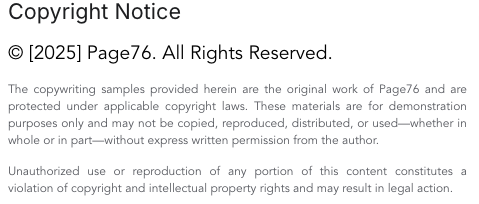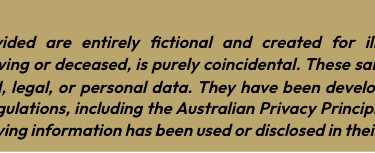Page76 | Our Words At Work | Medical | Medico-Legal
PAGE76OUR WORDS AT WORKMEDICALMEDICO-LEGAL


INDEPENDENT MEDICAL ASSESSMENT REPORT
(Prepared for WorkCover / WorkSafe purposes)
Claimant: Mr J. L.
Date of Birth: 14 March 1984
Date of Injury: 14 January 2025
Date of Examination: 3 June 2025
Date of Report: 15 June 2025
Referral Source: M. & Partners Solicitors
Examining Practitioner: Dr S. R., MBBS, FRACGP
AHPRA Registration Number: MED0123456789
Report Purpose: WorkCover Claim – Initial Injury Assessment
1. PURPOSE OF ASSESSMENT
This independent medical assessment has been requested for the purposes of a WorkCover claim. The report assesses the nature and extent of injuries sustained by Mr J. L. in the course of his employment on 14 January 2025, as well as his capacity for work and treatment requirements.
2. BACKGROUND / MECHANISM OF INJURY
Mr L. reports that on 14 January 2025, while working as a delivery coordinator for a logistics company, he was seated in his work vehicle at a red light when it was struck from behind by a third-party vehicle travelling at high speed (~60 km/h). He was wearing a seatbelt and experienced immediate neck and lower back pain.
The incident was reported to his employer and WorkCover claim documentation has been submitted.
3. CURRENT SYMPTOMS (AS REPORTED BY CLAIMANT)
Persistent cervical spine stiffness and discomfort
Lumbar pain, worsened by prolonged sitting or bending
Headaches localised at the base of the skull, described as tension-related
Difficulty sleeping due to pain and disrupted posture
Reduced tolerance for desk-based work
4. MEDICAL HISTORY
No previous history of spinal injury or chronic musculoskeletal conditions
No current comorbidities
No known allergies
No prior WorkCover claims
Non-smoker; occasional alcohol use
5. EMPLOYMENT DETAILS
Mr L. is employed full-time as a delivery coordinator. The role involves vehicle operation, moderate lifting, and prolonged computer use. He returned to work in a reduced capacity one week after the injury but continues to experience difficulty with sitting and repetitive physical tasks.
6. EXAMINATION FINDINGS
Cervical Spine:
Reduced range of motion (flexion and rotation to approx. 70–75%)
Palpable tenderness over trapezius and paraspinal muscles
No neurological deficits
Lumbar Spine:
Mild paraspinal tenderness
Normal posture and gait
Negative straight leg raise
Reflexes, sensation and power normal in both lower limbs
7. DIAGNOSIS
Whiplash-Associated Disorder (WAD Grade II) – Cervical Spine
Lumbar soft tissue strain (muscular)
These injuries are consistent with a low-to-moderate force rear-end collision and represent soft tissue trauma without evidence of radiculopathy or structural damage.
8. CAPACITY FOR WORK
Mr L. is currently fit for modified duties with restrictions including:
No prolonged sitting (>45 minutes without a break)
No repetitive lifting >5kg
Avoidance of bending and twisting tasks
He is not fit for full pre-injury duties at this stage. Anticipated return to full duties within 6–10 weeks with ongoing treatment.
9. TREATMENT AND MANAGEMENT
Recommended:
Physiotherapy (manual therapy and graded exercise program)
Ergonomic review of workstation
Home-based exercise program
Reassess in 6–8 weeks to monitor progress
No further specialist referrals or imaging indicated at this stage.
10. PROGNOSIS
Prognosis is favourable. With appropriate conservative management, Mr L. is expected to recover fully within 3–6 months of injury. No long-term impairment anticipated.
11. CAUSATION
In my clinical opinion, the reported injuries are directly caused by the work-related motor vehicle incident of 14 January 2025. There is no evidence of prior injury or unrelated pathology.
DECLARATION
I confirm that this report is independent and impartial, and that I have no conflict of interest in this matter. I have prepared this assessment in accordance with the Guidelines for the Evaluation of Work-Related Injuries under WorkSafe Victoria protocols.
Signed:
Dr S. R.
MBBS, FRACGP
AHPRA Reg: MED0123456789
15 June 2025
Melbourne, VIC
[Word count: 603






COMCARE MEDICO-LEGAL PSYCHIATRIC REPORT
(Prepared for the purposes of the Safety, Rehabilitation and Compensation Act 1988)
Examinee: Ms R. F.
Date of Birth: 17 July 1991
Date of Examination: 4 June 2025
Date of Report: 17 June 2025
Referring Party: Mr D. C., A. Legal Group
Examining Psychiatrist: Dr M. T., MBBS, FRANZCP
AHPRA Registration: MED0123456789
Purpose: Independent Psychiatric Assessment – Comcare Claim
1. INTRODUCTION
This independent medico-legal psychiatric report has been prepared at the request of the referring solicitor in accordance with the Safety, Rehabilitation and Compensation Act 1988 (Cth) (SRC Act). The purpose is to evaluate whether Ms R. F. has suffered a psychiatric injury arising out of or in the course of her employment with a Commonwealth employer, the nature and severity of that injury, causation, treatment needs, and work capacity.
2. EMPLOYMENT & INCIDENT HISTORY
Ms F. commenced employment in 2018 as a Finance Officer with a Commonwealth agency (name withheld). She reports that from approximately May 2023, she began experiencing repeated workplace bullying and unreasonable management practices following a change in direct supervision. Specific allegations include:
Frequent public criticism and belittling
Unrealistic performance demands
Being excluded from meetings
Intimidating tone and verbal hostility
She attempted to report these behaviours through internal HR channels, but perceived no corrective action. She remained at work until February 2024, when her GP certified her unfit for duties due to psychological distress. A Comcare claim was lodged shortly thereafter.
3. PSYCHIATRIC HISTORY
No prior mental health diagnosis, treatment, or hospitalisation
No psychiatric medication use prior to 2024
No history of substance misuse
No significant family history of mental illness
4. PRESENTING SYMPTOMS (AT TIME OF ASSESSMENT)
Ms F. reports the following:
Persistent low mood and loss of interest in previously enjoyable activities
Generalised anxiety, with intrusive workplace-related thoughts
Sleep disturbance (difficulty initiating and maintaining sleep)
Avoidance of social and professional interactions
Reduced confidence, hopelessness, and feelings of worthlessness
Panic attacks triggered by thoughts of work or performance pressure
5. MENTAL STATE EXAMINATION
Appearance: Neatly dressed; appropriate grooming
Behaviour: Anxious, cooperative
Speech: Soft, slowed
Mood: “Flat and overwhelmed”
Affect: Constricted
Thought content: No delusions or hallucinations; passive suicidal ideation (no plan)
Cognition: Mild impairment in concentration
Insight and judgement: Intact
Risk: No current active risk, but heightened psychological vulnerability
6. DIAGNOSIS (DSM-5 TR)
F32.1 Major Depressive Disorder, Moderate
F41.1 Generalised Anxiety Disorder
These conditions developed secondary to workplace stressors as reported.
7. CAUSATION
Based on the information provided, clinical interview, and standard psychiatric evaluation, I am of the opinion that Ms F’s psychiatric condition arose out of and in the course of her Commonwealth employment. The temporal relationship, consistent symptom profile, and lack of any pre-existing psychiatric history support a clear causal link between her employment and her psychological injury.
8. REASONABLE MANAGEMENT ACTION
I am not aware of sufficient evidence to conclude that the employer’s conduct falls under the provisions of "reasonable administrative action carried out in a reasonable manner" (per Section 5A of the SRC Act). In my opinion, the managerial behaviours described were excessive, sustained, and psychologically injurious, and likely exceed what would be considered reasonable management.
9. TREATMENT
Current Treatment:
GP-led mental health care plan
Weekly cognitive behavioural therapy sessions
Sertraline 100mg daily (SSRI) commenced in March 2024
Recommended Treatment:
Ongoing psychological therapy with a trauma-informed focus
Continuation of pharmacotherapy (review after 6 weeks)
Psychiatric review in 3 months to evaluate need for medication adjustment
Structured return-to-work support program with psychological monitoring
10. WORK CAPACITY
Ms F. is currently unfit for work in any capacity.
A graded return to suitable employment (non-client-facing, low-stress, with flexibility and remote option) may be considered within 3–6 months, depending on her therapeutic progress. She is not fit to return to the same workplace or under the same supervision.
11. PROGNOSIS
With consistent treatment and workplace modification, Ms F’s prognosis is fair to good. However, full functional recovery may take 12–18 months, and her confidence in public sector roles may remain impaired. Risk of recurrence is moderate in high-stress settings or if prematurely returned to work.
12. PERMANENT IMPAIRMENT (IF REQUESTED)
A permanent impairment assessment under the Comcare Guide (PI Guide for Psychiatric Conditions) has not been conducted during this evaluation. If required, a structured PIRS assessment (Psychiatric Impairment Rating Scale) can be undertaken in a follow-up appointment.
13. DECLARATION
I confirm that I have no actual or perceived conflict of interest in this matter. I have prepared this report in accordance with the Expert Witness Code of Conduct and acknowledge that my duty is to the Court, Tribunal, or instructing authority, not the party instructing me.
Signed:
Dr M. T.
MBBS, FRANZCP
Consultant Psychiatrist
AHPRA Reg: MED012345
17 June 2025
Canberra, ACT
[Word count: 782]




